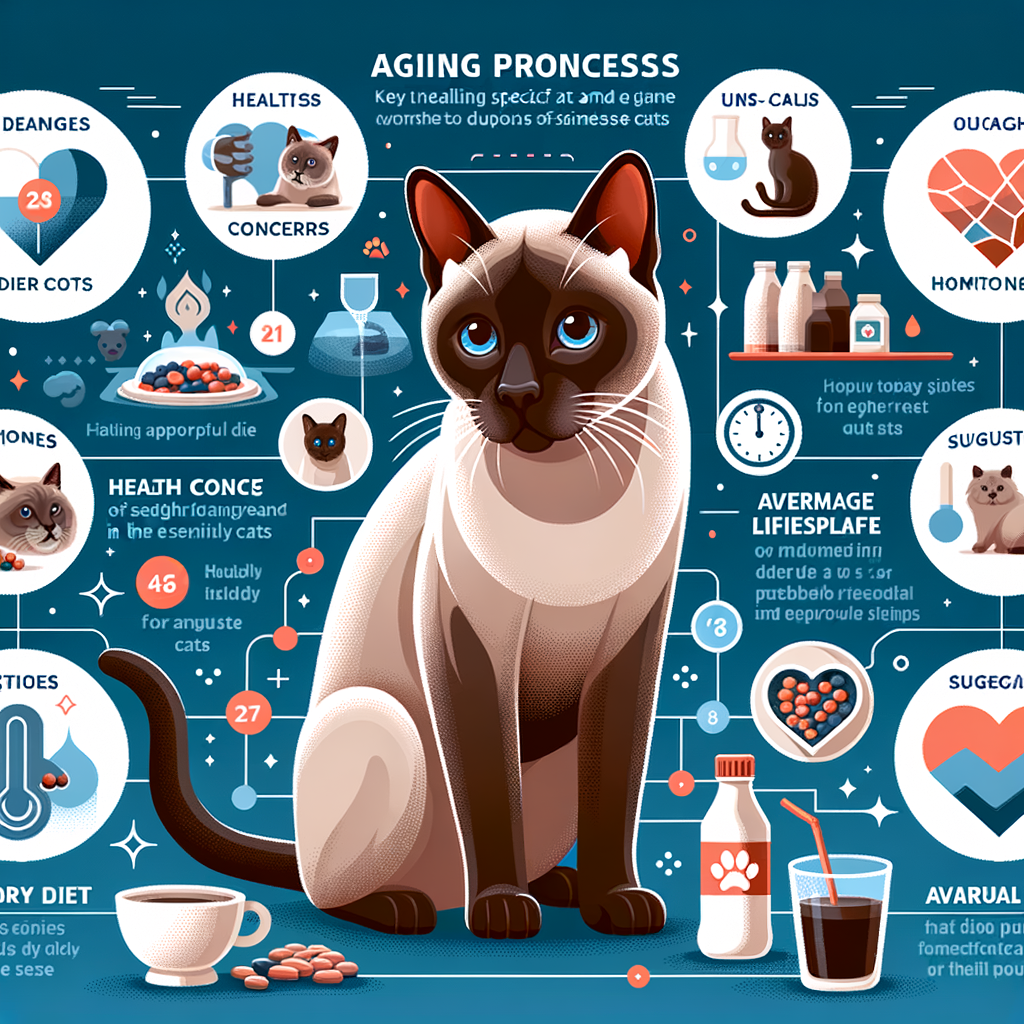
Introduction to Siamese Cat Aging
As a Siamese cat owner, it’s essential to understand the aging process of your feline friend. Aging in Siamese cats is a natural process, but it comes with certain changes that you need to be aware of. This will help you provide the best care for your cat as it grows older.
- Understanding the Siamese Cat Aging Process
- Recognizing the Signs of Aging in Siamese Cats
Siamese cats, like other cat breeds, go through various stages of life. They start as kittens, grow into adults, and eventually become seniors. On average, a Siamese cat is considered a senior at around 10 years of age. However, this can vary depending on factors such as health, diet, and lifestyle.
As Siamese cats age, they may experience changes in their behavior, physical appearance, and health. They may become less active, lose or gain weight, and develop age-related health issues. It’s important to note that these changes are a normal part of the aging process and not necessarily a cause for concern. However, sudden or drastic changes should be checked by a vet.
Recognizing the signs of aging in Siamese cats is crucial for their well-being. Some common signs of aging include decreased activity, changes in weight, and changes in behavior. For instance, your cat may sleep more, eat less, or become less interested in play. They may also develop age-related health issues such as arthritis, dental disease, or kidney disease.
It’s important to monitor your Siamese cat closely as it ages. Regular vet check-ups are essential to catch any potential health issues early. Remember, early detection and treatment can significantly improve your cat’s quality of life in its senior years.
In conclusion, understanding the aging process and recognizing the signs of aging in Siamese cats are key to providing them with the best care. As your Siamese cat grows older, it’s your responsibility to ensure they remain healthy and comfortable. Stay tuned for more tips on senior Siamese cat health and care.
Senior Siamese Cat Health
As your Siamese cat enters its golden years, it’s crucial to be aware of the common health issues they may face. Understanding these health problems can help you provide the best care for your senior Siamese cat.
Common Siamese Cat Health Issues
Siamese cats, like all breeds, are prone to specific health issues, especially as they age. Let’s explore some of these common health problems and how to manage them.
- Identifying and Treating Health Problems
- Preventive Measures for Common Health Issues
Early detection of health issues can significantly improve your cat’s quality of life. Some common health problems in senior Siamese cats include dental disease, kidney disease, and obesity. If your cat shows signs of discomfort, changes in behavior, or weight loss or gain, it’s essential to consult a vet immediately.
Treatment for these issues varies. Dental disease may require professional cleaning or even tooth extraction. Kidney disease can often be managed with a special diet and medication. Obesity can be tackled with a balanced diet and regular exercise. Always follow your vet’s advice for the best results.
Prevention is always better than cure. Regular vet check-ups can help catch issues early, before they become severe. A balanced diet and regular exercise can help prevent obesity. Dental hygiene, such as brushing your cat’s teeth, can prevent dental disease.
Remember, every cat is unique. What works for one might not work for another. Always consult your vet before making any significant changes to your cat’s lifestyle or diet.
Senior Siamese cat health doesn’t have to be a mystery. By understanding the common health issues they face and how to prevent and treat them, you can ensure your furry friend enjoys their golden years in comfort and health.
Importance of Regular Vet Check-ups
Regular vet check-ups are crucial for maintaining the health of your senior Siamese cat. They not only help in early detection of potential health issues but also ensure that your cat is aging gracefully. Let’s delve deeper into the importance of these check-ups.
- Role of Regular Vet Visits in Senior Siamese Cat Health
- What to Expect During a Vet Check-up
As your Siamese cat ages, its immune system weakens, making it more susceptible to various health issues. Regular vet visits play a vital role in monitoring your cat’s health and detecting any signs of illness early. They allow the vet to keep track of your cat’s weight, dental health, and overall condition. Regular blood tests can also help identify any underlying issues that may not be apparent through a physical examination.
According to a study, regular vet visits can increase the lifespan of your cat by up to 20%. This is because early detection and treatment of diseases can significantly improve your cat’s quality of life and longevity.
During a vet check-up, the vet will typically conduct a thorough physical examination of your cat. This includes checking the cat’s eyes, ears, skin, teeth, and gums. They will also listen to the cat’s heart and lungs, and examine its abdomen for any abnormalities. The vet may also perform blood tests, urine tests, and other diagnostic tests if necessary.
Furthermore, the vet will ask you about your cat’s diet, behavior, and any changes you may have noticed. This information can provide valuable insights into your cat’s health and well-being. The vet will also provide advice on diet, exercise, and preventive care to keep your cat healthy as it ages.
In conclusion, regular vet check-ups are an essential part of senior Siamese cat care. They not only help in early detection and treatment of health issues but also provide an opportunity for you to learn more about your cat’s health and how to care for it as it ages.
Mastering Siamese Cat Care
As your Siamese cat ages, their needs change. It’s important to understand these changes to provide the best care possible. One of the most crucial aspects of senior Siamese cat care is their diet.
Senior Siamese Cat Diet
As Siamese cats age, their dietary needs evolve. They require a balanced diet that caters to their changing nutritional needs and health conditions. Let’s delve into the nutritional needs of older Siamese cats and how to choose the right food for them.
- Nutritional Needs of Older Siamese Cats
- Choosing the Right Food for Your Senior Siamese Cat
Senior Siamese cats need a diet rich in proteins and low in fats. They require essential nutrients like taurine, vitamins A, D, E, and K, and omega-3 fatty acids. These nutrients help maintain their muscle mass, support their immune system, and promote healthy skin and coat.
| Nutrient | Benefit |
|---|---|
| Protein | Maintains muscle mass |
| Vitamins A, D, E, K | Supports immune system |
| Omega-3 fatty acids | Promotes healthy skin and coat |
When choosing food for your senior Siamese cat, consider their health status, weight, and personal preferences. Opt for high-quality cat food that is specifically formulated for senior cats. This food should be high in protein, low in fat, and enriched with essential nutrients. Always consult with your vet before making any significant changes to your cat’s diet.
In conclusion, a balanced diet is crucial for your senior Siamese cat’s health. By understanding their nutritional needs and choosing the right food, you can ensure they live a healthy and happy life in their golden years.
Exercise and Play for Senior Siamese Cats
As your Siamese cat grows older, it’s crucial to maintain their physical activity. Regular exercise and engaging play are vital for their overall health and happiness. Let’s dive into the importance of these activities and explore some safe and fun play ideas for your senior Siamese cat.
- Importance of Regular Exercise
- Safe and Engaging Play Ideas for Older Siamese Cats
- Interactive Toys: Toys that move or make noise can stimulate your cat’s hunting instincts, keeping them engaged and active.
- Puzzle Feeders: These not only provide physical activity but also mental stimulation.
- Gentle Play: A simple feather or string can entertain your cat, encouraging gentle swatting and pouncing without too much strain.
Regular exercise is essential for senior Siamese cats. It helps maintain a healthy weight, reducing the risk of obesity-related health issues. Exercise also keeps their joints flexible and muscles toned, which can help alleviate symptoms of arthritis, a common issue in older cats. Moreover, physical activity stimulates their mind, helping to prevent cognitive decline.
When it comes to playtime, it’s important to consider your senior Siamese cat’s physical limitations. Here are some safe and engaging ideas:
Remember, it’s important to monitor your cat during playtime to ensure they are not overexerting themselves.
In conclusion, regular exercise and engaging play are key to keeping your senior Siamese cat healthy and happy. Always remember to tailor activities to your cat’s abilities and preferences, and consult with your vet if you have any concerns about their physical activity.
Elderly Siamese Cat Tips
As your Siamese cat enters its golden years, it’s important to make some adjustments to ensure their comfort and happiness. Here are some tips to help you create a comfortable environment for your elderly Siamese cat.
Creating a Comfortable Environment
Creating a comfortable environment for your aging Siamese cat involves two main aspects: adjusting your home and implementing comfort measures.
- Adjusting Your Home for Your Aging Siamese Cat
- Lower the height of their litter box for easy access.
- Place their food and water bowls in easily reachable areas.
- Provide soft and warm sleeping spots in quiet areas.
- Use nightlights to help them navigate in the dark.
- Comfort Measures for Senior Siamese Cats
- Regular grooming to prevent matting and skin issues.
- Providing a balanced diet suitable for their age.
- Ensuring they have plenty of fresh water to prevent dehydration.
- Regular vet check-ups to monitor their health.
As cats age, their mobility and senses may decline. This means that your home may need some adjustments to accommodate these changes. Here are some suggestions:
Comfort measures are steps you can take to ensure your Siamese cat’s physical comfort. These can include:
Remember, every cat is unique. What works for one might not work for another. It’s important to observe your Siamese cat and adjust their environment and care routine based on their individual needs and preferences.
Managing Behavioral Changes
As your Siamese cat ages, you may notice some changes in their behavior. These changes can be a normal part of aging, but they can also be signs of underlying health issues. It’s important to understand and address these changes to ensure your cat’s well-being.
- Understanding and Addressing Behavioral Changes in Older Siamese Cats
- When to Seek Professional Help
Siamese cats are known for their lively and playful nature. However, as they age, they may become less active and more withdrawn. This could be due to a variety of factors, such as arthritis, dental problems, or even cognitive decline. It’s important to monitor these changes and make necessary adjustments to their routine and environment.
For example, if your cat is less active due to arthritis, you might consider providing them with a heated bed or a ramp to help them navigate around the house. If they are withdrawing due to dental problems, a visit to the vet and a change in diet might be necessary. If cognitive decline is suspected, mental stimulation through interactive toys or puzzles can be beneficial.
While some behavioral changes can be managed at home, others may require professional help. If your cat is showing signs of severe distress, such as excessive vocalization, aggression, or changes in eating or elimination habits, it’s time to consult a vet. These could be signs of serious health issues like kidney disease or hyperthyroidism.
Remember, early detection and intervention can make a significant difference in your cat’s health and quality of life. So, don’t hesitate to seek professional help when necessary.
In conclusion, managing behavioral changes in older Siamese cats involves understanding the changes, making necessary adjustments, and seeking professional help when needed. With the right care and attention, your aging Siamese cat can continue to live a happy and fulfilling life.
Conclusion: Siamese Cat Senior Care Guide
As we wrap up our discussion on senior Siamese cat care, it’s important to remember that every cat is unique, and their needs may vary. However, there are some general guidelines that can help you provide the best possible care for your aging Siamese cat.
- Recap of Essential Tips for Caring for Older Siamese Cats
- Importance of Love and Patience in Siamese Cat Care
Firstly, regular veterinary check-ups are crucial to monitor your cat’s health and detect any potential issues early. A balanced diet, rich in nutrients, is also essential for maintaining their health. Regular exercise can help keep your Siamese cat active and agile, while mental stimulation can keep their mind sharp. Lastly, grooming is not just about keeping your cat looking good, it’s also an opportunity to check for any skin issues or changes in their coat.
Secondly, caring for an older Siamese cat requires a lot of love and patience. As they age, they may become more dependent on you. They may also become less active and more prone to health issues. It’s important to be patient and understanding with them during this time. Remember, your love and care can greatly enhance the quality of their life in their golden years.
In conclusion, senior Siamese cat care is a journey filled with love, patience, and understanding. It’s about providing the best possible care for your feline friend as they age, ensuring they live a comfortable, happy, and healthy life. Remember, the love you give to your Siamese cat will be returned to you tenfold.








